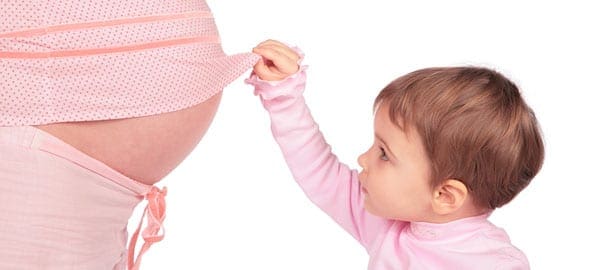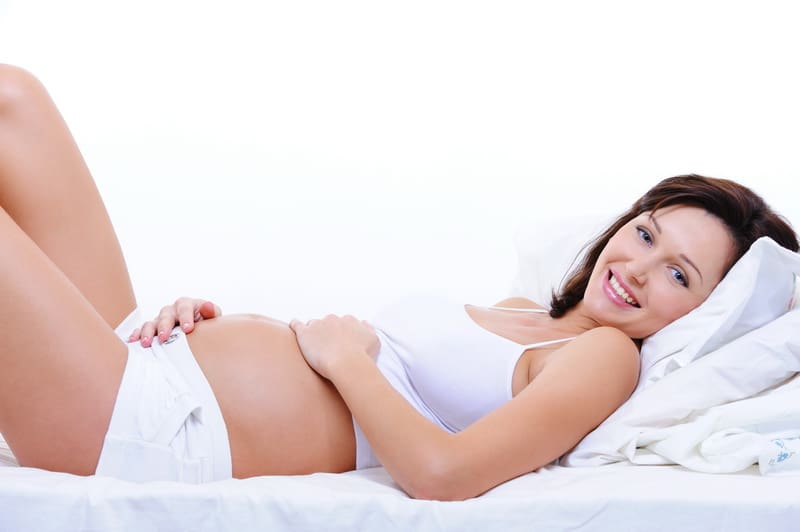Bloating, Cramps and Backache in Early Pregnancy
Before or during their menstrual cycle, many women experience bloating, cramping, and minor backaches as their uterus begins to grow. Other early pregnancy symptoms may include:
lighter bleeding or no period
cardiovascular, blood flow and temperature changes
nipples and breasts change
frequent visits to the toilet
morning sickness
saliva increase
fainting and dizziness
headaches
exhaustion and tiredness
constipation and wind
early pregnancy libido changes
Lighter Bleeding or No Period
The most noticeable symptom that indicates a woman may be pregnant is the skipping of a menstrual period. However, there are other signs and symptoms which may also be early pregnancy clues.
A woman’s missed period is not always an early sign of pregnancy. In addition to the confusion this can cause, it can also lead to misjudged due date calculations and worries about the continuation of the pregnancy.
Some women may experience something called ‘implantation bleed’ instead of a normal period, even though they have conceived. Implantation bleed is usually a light bleeding that occurs around 12 days after conception or the fertilization of the egg in the fallopian tube. This happens as the developing fetus begins to burrow into the lining of the mother’s uterus.
Implantation bleeds typically occur shortly before or around the same time as a woman’s next period would normally be due. However, it is usually not as long or heavy as a typical period.
Cardiovascular, Blood Flow and Temperature Changes
You may start to notice pregnancy symptoms 7-10 days after ovulation.
Blood Flow Increase during Early Pregnancy
Six weeks after the final period of a pregnant woman’s pregnancy, the volume of blood coursing through her body will gradually increase.
Pregnancy triggers some pretty amazing changes in your blood circulation. The most noticeable ones happen in your uterus and during the development of your placenta, which allows the fetus to get all the nutrients it needs. Blood flow to your skin also increases, so you might feel a bit warmer and even sweat more, especially in your feet and hands.
When you’re pregnant, your body is working overtime to accommodate the developing fetus and all of the changes that come along with it. One of the ways your body does this is by increasing blood flow, which in turn helps to boost your metabolism by about 20%. This extra body heat is necessary to protect you and your baby from feeling too cold. Your body core temperature will usually rise to around 37.8 Celsius, or 100.4 Fahrenheit, during pregnancy, whereas the average person has a body temperature of 37 Celsius, or 98.6 Fahrenheit. Surplus blood not only helps your body meet the metabolic requirements of your fetus but also flows to other vital organs, such as your kidneys.
Nipple and Breast Changes
Within a period of 2 to 4 weeks after conception, your breasts will go through significant changes.
Breast Changes during Pregnancy
Your breasts will begin to grow and develop under the influence of a hormone in the body known as estrogen. This hormone is responsible for most of the breast development during puberty.
The changes you might notice in your breasts during pregnancy are due to the formation of milk ducts in preparation for breastfeeding. An increase in blood supply will also cause the veins in your breasts to become more visible. Some women may experience changes in their breasts around the time of conception, and they may even notice these changes before their next period is due.
Frequent Visits to the Toilet
Many women frequently complain of a repeated urge to urinate during their early pregnancy. Most women will start to detect pregnancy or notice its symptoms 7 to 10 days after ovulation. However, it is more probable that you will not experience any symptoms until nearly the end of your 6-week gestation period.
Why an Urge to Urinate More
During pregnancy, your kidneys work overtime to produce more urine. This is due to an increased flow of blood to your kidneys, which may be about 35 to 60% more. Shortly after conception, this additional blood makes your kidneys produce more urine, by about 25%. This increased production of urine peaks around nine to fifteen weeks of your pregnancy before gradually settling down.
Additionally, your growing uterus can also cause pressure on your bladder, which in turn results in needing to urinate more frequently during the last three months of pregnancy. This is because not only has your baby become heavier, but they have also moved down into your pelvis in the weeks leading up to birth.
Morning sickness, more accurately called ‘all-day sickness’, is a very common symptom of early pregnancy. It is caused by the high levels of pregnancy hormones in your body. These hormones cause an overwhelming feeling of nausea or possibly vomiting.
When You Are Struck By Morning Sickness
Many women have a strong gag reflex, and certain smells or odors can trigger it. Sometimes even pushing a toothbrush down too far can cause an overwhelming feeling of nausea.
Around 85 percent of pregnant women contend with morning sickness to some degree. It’s often one of the first signs of pregnancy, appearing around four weeks in, and it can last until the twelfth week of pregnancy. For many women, morning sickness is just a minor inconvenience. But for some, it’s more severe.
Saliva Increase
During the 6-week gestation period, it’s not uncommon for your salivary glands to produce more saliva than usual – even if it’s highly unappetizing.
Excessive Salivation during Early Pregnancy
Many women may find that they are producing excessive saliva during pregnancy. For some, this can be highly unpleasant and nauseating. Some may even blame it as the primary cause of morning sickness.
Excessive saliva, also known as ptyalism, is a medical condition that can develop on its own or be associated with other symptoms like vomiting and nausea. It’s commonly seen during the early stages of pregnancy, when morning sickness is most prevalent.
Fainting and Dizziness
Though dizziness is a common symptom in early pregnancy, fainting or ‘syncope’ is less common.
Fainting and Dizziness during Early Pregnancy
In Victorian times, fainting was considered a more unsophisticated manner of recognizing that a lady was actually pregnant. However, this simple physical gesture was not too far from the truth. Fainting in early or even mid-pregnancy periods may be the causative result of natural dilation and relaxation of your blood vessels under the sway of the hormone known as progesterone. Progesterone lowers your blood pressure, which may lead to fainting episodes.
Headaches
Many pregnant women experience common hormonal fluctuations in the weeks after conception, which can result in headaches.
Headaches during Early Pregnancy
The ironic thing about headaches during early pregnancy is that women are more prone to them, but they’re not supposed to take painkillers.
Headaches during pregnancy are unfortunately quite common, but they’re usually caused by hormonal changes taking place in a woman’s body during the first 12 weeks of pregnancy. Another potential cause of headaches during pregnancy is an increase in the volume of blood circulating throughout the woman’s body.
Exhaustion and Tiredness
Though it’s common to feel exhausted during the early stages of pregnancy, it’s not necessarily only due to the changed hormonal state or the growth of the baby.
Excessive Tiredness during Early Pregnancy
It is not abnormal to feel excessively tired at various stages of your pregnancy. A lot of women who are newly pregnant may experience extreme fatigue in their initial 12-week pregnancy period.
Constipation and wind
Bloating in your stomach or having issues with going to the bathroom can be a common symptom during your first trimester, but it can also come back again during the last trimester of pregnancy.
Constipation and Wind during Early Pregnancy
Normal constipation, or the difficulty in opening up your bowels, is usually caused by the progesterone hormone which decreases the movement of your gut.
Therefore, the longer food is retained in your intestines, the higher the volume of water that is slowly reabsorbed back into your bowels and back into the system. This makes it even more difficult to have a bowel movement.
Early Pregnancy Libido Changes
Libido and sex play a large role in conception, and generally speaking, these areas of life change significantly in the weeks following conception. For women who feel a sense of freedom from contraception after becoming pregnant, sex can turn into a celebration of their pregnancy. The increased blood flow to their genitals and breasts that comes with pregnancy can help to increase sensitivity, sexual desire, and sexual arousal. For many women, the first few months after becoming pregnant are marked by nausea, vomiting and fatigue, making sex the last thing they want to do.
Cramping Following Conception
In the initial weeks following conception, some women may worry when feeling moderate pulling, tugging and cramping. These conditions are normal, and some women find relief in taking salts like ‘Mag Phos.’
If you experience cramping that is accompanied by bleeding, it is mostly normal. However, if you experience severe or strong pain or cramping, you should immediately consult your local physician for further advice and guidance.
Aches and Cramps
During pregnancy, pains and aches are common, just as expected muscle cramps in the legs, thighs and feet. Though the precise reason for them is unknown, it is strongly suspected that expansion of the uterus may be responsible for applying pressure on blood vessels and nerves in your legs, causing occasional pain and leg cramps.
If you experience cramps, try stretching the affected muscle or limb. You can also try straightening the leg so that your toes face in your direction. If needed, your partner can help with this. Standing up so that your leg is stretched can also provide some relief. If pain in your cramps persists, ask your partner for a massage. You may also want to call for professional massage to make the best use of your relaxation period – this would be excellent for you!
Your diet plays a big role in keeping you healthy and preventing cramps. These nutrients are essential to maintain balanced electrolytes levels in your body: phosphorous, potassium and calcium. You can find them in many forms, such as supplements, but always check with your physician first. A healthy diet also goes a long way. Include leafy vegetables and fresh fruits, as well as calcium-rich foods such as yogurt, cheese and milk, to make sure you’re getting what you need.
Stomach Cramps and Constipation
It’s important to consume plenty of fluids and exercise regularly if you want to avoid dehydration, which can cause constipation. When you don’t consume enough fluids, it causes your blood volume to drop, and that’s when you start to feel the effects of dehydration like constipation. So make sure you’re drinking lots of fluids, eating healthy snacks, and getting regular exercise – that way you can stay hydrated and avoid any uncomfortable digestive issues.
Laxative use is not recommended without your physician’s approval. If you are suffering from constipation on a consistent basis, make sure to discuss this condition with your prenatal care physician. Straining may cause hemorrhoids, and thus it is best to avoid it if possible.
Backache during Early Pregnancy
Backaches during early pregnancy are unfortunately quite common. As your pregnancy progresses and your baby grows, your center of gravity will shift forward, causing strain on your back. This is because most of your weight will be pushing forward, resulting in your torso and posture gradually losing alignment. In short, your center of gravity will shift forward.
Lack of sleep is another factor that can contribute to back pain. When you toss and turn at night, your womb weight stretches the muscles in your back, resulting in pain and discomfort.
As your body prepares for childbirth, a number of your ligaments and joints will start loosening up in order to facilitate the delivery process. All these changes put together can result in backache, which is the common early symptom of pregnancy. It is estimated that 50% of most pregnant women experience this symptom.




.jpg)






